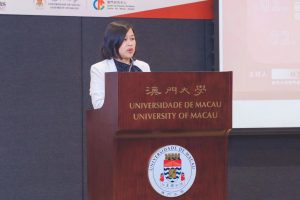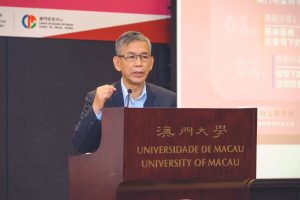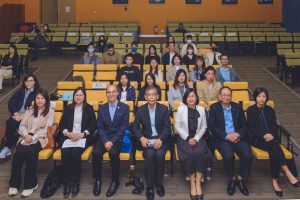The Centre for Macau Studies (CMS) of the University of Macau (UM) and Caritas Macau today (16 March) co-organised an experience sharing session titled ‘At the Front Line of the Community against the Epidemic: Caritas Macau’s Experience in Coping with COVID-19’. During the event, members of Caritas Macau, including representatives of five service units, namely Caritas-Life Hope Hotline of Macau, Complexo de Serviços de Apoio Ao Cidadão Sénior Retribuição, Brilho da Vida Elderly Centre, Casa Corsel, and WelAnser Centre, discussed the organisation’s epidemic prevention strategy, psychological support service, temporary accommodation and assistance to people stranded in Macao, as well as services for the elderly and people with disabilities in residential care homes.
Agnes Lam Iok Fong, director of CMS, said that Caritas Macau stood at the forefront of social services when Macao’s epidemic situation was uncertain. They assisted people who needed help in the most difficult times and their experience in coping with the epidemic is worth sharing and learning from. She added that through the sharing of Caritas Macau members, UM faculty members, students, and researchers can obtain first-hand information about frontline social services in Macao during the epidemic, and expressed hope that the sharing would inspire the UM members to expand their research and contribute to the community with their academic work.
According to Pun Chi Meng, secretary-general of Caritas Macau, when there is an epidemic, more people than usual need social services, especially the most vulnerable ones. As a social service organisation, Caritas Macau’s priority at the time was to maintain its existing services in a way that did not increase the burden of the community and to help those in need as much as possible. Over the past three years, Caritas Macau and the general public have overcome many challenges and gained valuable experience together. In this process, members of Caritas Macau have strengthened their crisis response and interdisciplinary collaboration skills, which will help them face various uncertain situations in the future.
The event included presentations on different topics by members of Caritas Macau: Julia Lam, deputy service director of Caritas Macau, discussed the epidemic prevention strategy of the organisation; Ng Lai Ieng, director of Caritas-Life Hope Hotline of Macau, shared how Caritas Macau’s hotline service provided psychological support for those in need during COVID-19; Ada Kuan, dean of Complexo de Serviços de Apoio Ao Cidadão Sénior Retribuição, discussed how the organisation protected the elderly and people with disabilities in residential care homes during the epidemic; Cheang Ka Leng, director of Brilho da Vida Elderly Centre, talked about the situation of the social housing building Edifcio Fai Fu when it became an epidemic containment zone; Ip Chi Leng, director of Casa Corcel, shared how Caritas Macau’s temporary accommodation service assisted those stranded in Macao during the epidemic; and Chan Si Ian, director of WelAnser Centre, talked about how Caritas Macau’s outreach programmes encouraged foreigners in Macao to join the battle against COVID-19. In addition to the speakers of Caritas Macau, the event was attended by Xu Jianhua, head of the Department of Sociology, as well as faculty members, students, and researchers of sociology, psychology, and Macau studies.
| Source: Centre for Macau Studies | |
| Media Contact Information: | |
| Communications Office, University of Macau | |
| Albee Lei | Tel: (853) 8822 8004 |
| Debby Seng | Tel: (853) 8822 8014 |
| Email: | prs.media@um.edu.mo |



